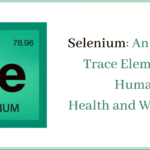Healthy sodium levels
As one of the essential minerals required by the human body, sodium plays a vital role in several critical bodily functions. Sodium is an essential mineral that the human body requires to function correctly. It plays a vital role in maintaining fluid balance, transmitting nerve impulses, and aiding muscle contractions. However, excessive intake of sodium can lead to various health issues such as high blood pressure, heart disease, and stroke.
To maintain Healthy sodium levels, it is essential to understand the recommended Sodium intake limit, the dangers of excessive sodium intake, and ways to reduce sodium intake. This blog post aims to shed light on these aspects and offer practical tips to help reduce sodium intake in your diet.
Sodium and Your Body
Sodium, an essential electrolyte, performs a crucial role in regulating fluid balance and transmitting nerve impulses, making it vital for overall health. However, excessive sodium consumption can disrupt this delicate balance, leading to several health complications.
To maintain optimal health, adults are advised to consume less than 2,300 milligrams of sodium daily. Those with underlying health conditions or high blood pressure should limit their sodium intake to 1,500 milligrams per day, as recommended by the American Heart Association. Complying with these guidelines can help individuals maintain Healthy sodium levels, reducing the risk of associated health problems.
A well-balanced diet rich in whole foods, vegetables, and fruits can help control sodium intake. Additionally, reducing processed food consumption, avoiding adding salt to meals, and checking food labels for sodium content can assist in regulating sodium consumption.
By adopting healthy habits, individuals can maintain optimal sodium levels and promote overall health and well-being.
The Dangers of Too Much Sodium
Excessive sodium consumption is linked to several health concerns, including high blood pressure, heart disease, stroke, and kidney disease. High blood pressure significantly contributes to heart disease and stroke, and the risk of developing these conditions rises with excessive sodium intake.
The Centers for Disease Control and Prevention (CDC) reveals that over 70% of sodium intake in our diets comes from processed and restaurant foods, many of which contain high levels of sodium. This underscores the need for vigilance and mindfulness in reading food labels to detect hidden sources of sodium. Choosing healthier alternatives and taking steps to reduce the intake of such foods can help maintain Healthy sodium levels and promote overall well-being.
By making small but impactful changes in our diet, such as reducing processed and restaurant food consumption, individuals can manage sodium intake, lower the risk of associated health problems, and improve their overall quality of life.
Tips for Reducing Sodium Intake
Reducing sodium intake can help maintain Healthy sodium levels and reduce the risk of developing health problems such as high blood pressure and heart disease. Here are some practical tips to help reduce sodium intake in your diet:
- Eat a balanced diet: A balanced diet that includes fruits, vegetables, whole grains, and lean proteins can help reduce sodium intake.
- Choose low-sodium foods: Look for foods labeled as low-sodium or sodium-free. Many foods like soups, sauces, and condiments have low-sodium alternatives.
- Use herbs and spices: Instead of using salt to flavor your food, try using herbs and spices. Some great options include garlic, ginger, cinnamon, and turmeric.
- Cook at home: When you prepare meals at home, you know exactly what goes into them and may limit the amount of sodium you consume.
- Be mindful when eating out: When eating out, ask for your food to be prepared without added salt or sauces, and avoid dishes that are typically high in sodium.
Conclusion
Ensuring Healthy sodium levels is crucial for maintaining optimal health, as excessive sodium intake can result in many health issues, including high blood pressure, heart disease, and stroke. To minimize the risk of such health concerns, it is imperative to have a comprehensive understanding of the recommended daily Sodium intake limit, the adverse effects of excessive sodium consumption, and methods to decrease sodium consumption in your diet.
Incorporating practical tips into your routine can significantly reduce sodium intake and promote Healthy sodium levels. These tips include consuming a balanced diet, selecting low-sodium foods, incorporating herbs and spices into your meals, cooking at home, and being mindful when dining out.
By adopting these strategies, you can maintain optimal health and reduce the risk of developing health complications associated with excessive sodium intake.


